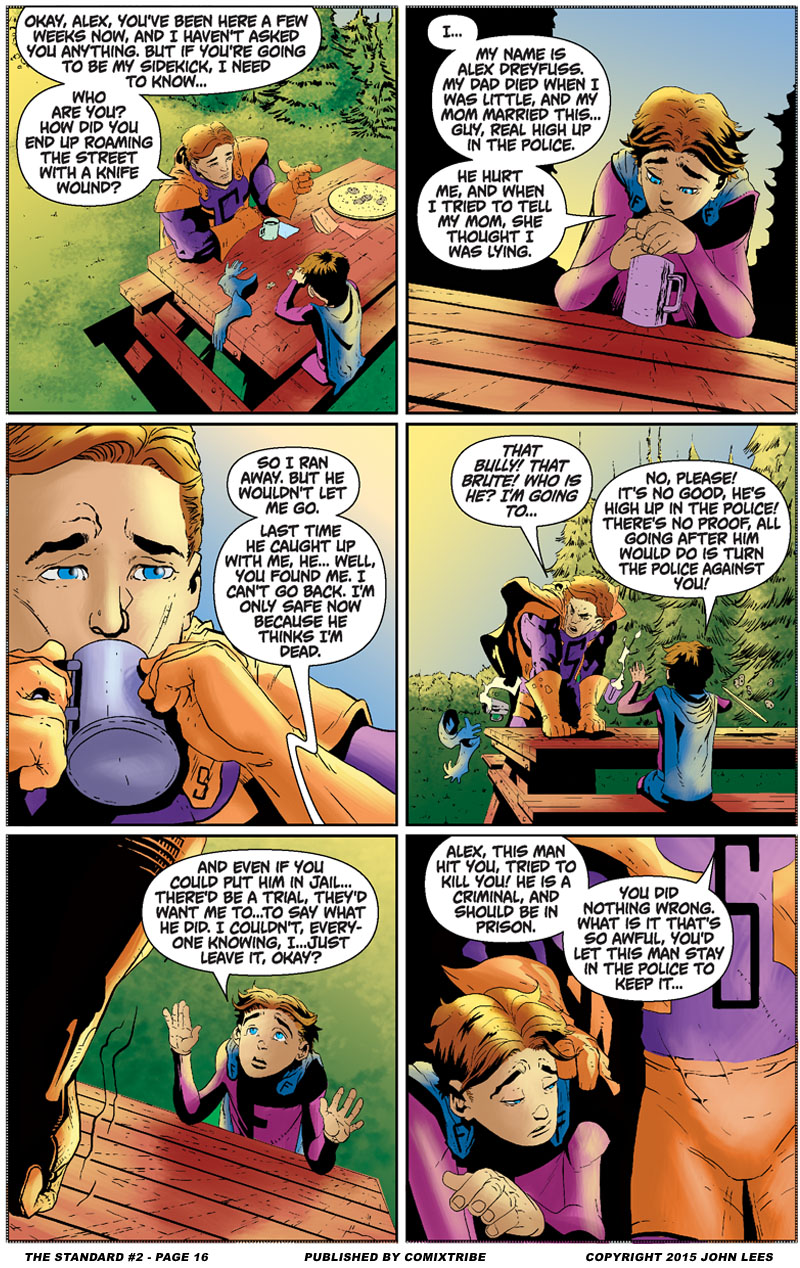The Standard #2 – Page 16
And here we get the all-too-human secret origin of Alex Thomas. Once again, we see darker tones creeping into the ostensibly more “innocent” past. Glimpsing Alex’s history of pain and his own status as a runaway child, the intention was to give readers a new dimension into why the case of missing Amy Harris resonated with Alex so much. For the most part, I like this page: Jon did a great job with the little bits of business with them nursing their cups of tea, and Kel deftly handles some hefty chunks of lettering. On my end, though, every time I look at that “high up in the police” line it feels like a bit of a clunker.
Our peek into the history of Alex Thomas concludes today with a bit of commentary on how he changed what it means to be a superhero in the fictional world of THE STANDARD:
THE CHANGING FACE OF SUPERHEROES
Just like Gilbert Graham in his time, Alex Thomas has inspired many people to become superheroes in his image. He actively encourages it in his Hero Watch TV show. But what has changed about this new wave of aspiring superheroes?
To me, the definition is a very simple one. In the past, becoming a superhero was about doing something. Today, it’s simply about being something. Back in the old days, it seemed like even the most under-qualified and overweight wannabe heroes at least tried to make a difference, even if it was as simple as returning missing pets to their owners or cleaning up graffiti. Nowadays? Too often it seems like simply getting a fancy costume, giving yourself a nickname, and setting up a profile for yourself on social networking site HeroFace is all you need to do to start calling yourself a superhero. In America alone, thousands of people are registered to HeroFace as “superheroes”, yet very few seem to actually do anything apart from uploading pictures of themselves in their costumes striking poses. It’s like spandex bodysuits were simply the latest must-have fashion accessory.
The watering down of this definition of hero was worsened by HeroFace adding in an additional option for people to register themselves as supervillains, with little discernable difference between them and the heroes (apart from an increased prominence of emo teenagers in the villain category), and neither side actually doing anything to cement their status in their respective camp apart from arguing with each other. So, the great battle between heroism and villainy has gone from The Standard battling giant robots in the streets of Sky City to a bunch of kids having a message board flame-war.
Despite this trivialisation of the superhero, there are still those who wish to honor what Gilbert Graham originated all those decades ago. There is a small but significant movement that refuse to associate themselves with The Standard’s media machine, instead fighting crime on their own terms. Lodestar, San Diego’s resident masked heroine, is one particularly celebrated example. Claiming to be a warrior from an alien planet who has taken Earth as her adopted home, she has strength and speed to rival even The Standard (some argue she even surpasses him). She famously turned down an offer from Alex Thomas to join his celebrity superteam, The Trailblazers, saying – in a rare public statement – that her commitment to helping the innocent and battling the corrupt didn’t give her time to watch TV, never mind be on it. The Gentleman Giant is another individual who has remained more interested in public service than celebrity.






Discussion ¬